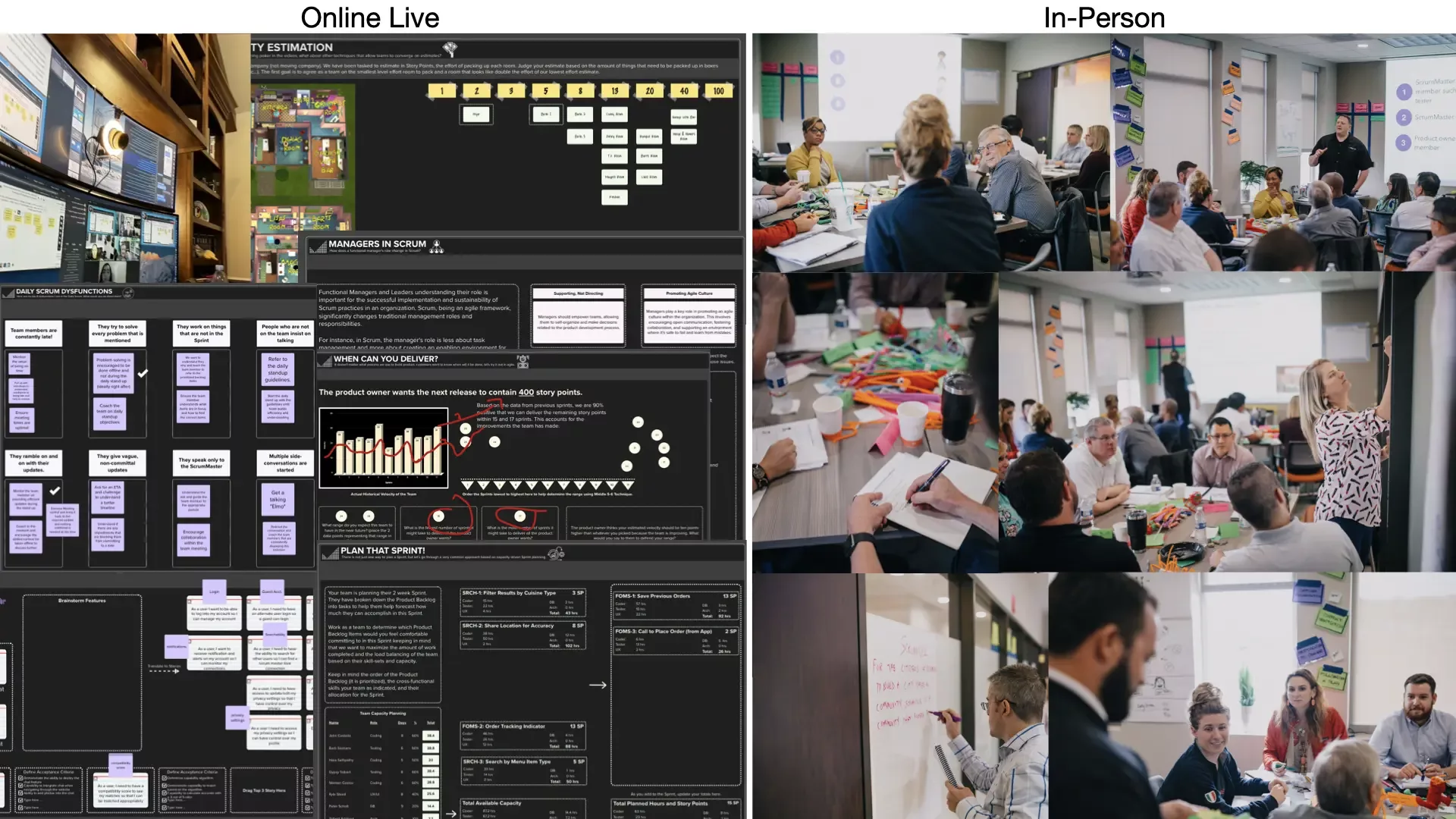
We often get this question: "Does the place where I take a CSM course matter?".
In short, yes. There are many reasons professionals seek out certification credentials. No, I don't believe a certification makes someone magical, but I do know that when sorting through piles of resumes, someone that has demonstrated discipline in obtaining knowledge (which certifications most of the time do); will stand out amongst others. However, not all certifications are created equal. In the end the workshop should catalyze an effort for the person on a path to improving. Whether you get a certification or not is up to you. Learning is the goal.
We have seen our fair share of certifications offered in the agile space with some "money grab" organizations that simply offer an online exam demonstrating you can answer 20-50 questions about a topic. The candidate receives a certificate and voila' they can apply and appear to be highly skilled in a topic if the hiring organization is not keen on the market in which they are hiring.
There are plenty of examples of organizations operating this way right now, namely:
- Scrum Study
- Scrum Institute
- Udemy
- Certifprof
While they are less costly than more industry recognized organizations, you also tend to get what you pay for; just like with anything. I certainly don't want to imply that these organizations have skimped on content or professionalism, just that many people fall for the trap that I only have to pay $100-$200 and I get a certification. So to answer the question, "does the place where I take a CSM course matter", we believe it does.
A few ways to tell if you are taking the certification from an accredited organization is if they have actual live instructors that will spend some amount of time at least answering questions and providing real-world scenarios based on those answers. Even better are the ones who spend countless hours designing a course that provides a strong foundation in learning objectives that are provided through organizations that have been around since the beginning and thus have built a great network of coaches / trainers.
In addition, those trainers have been through a thorough vetting process by the certifying body. Just about anyone these days can pass an exam by simply looking up answers on the Internet. Even the accredited organizations I am speaking of could likely have people pass their exam that way, but what is different is the knowledge gained through the certification process. A consistent set of learning objectives that change with the industry and align with the tenants of agile teams.
I have written about the difference in what I like to think of as the top two certifying bodies in the Scrum space. Both have great trainers and follow the same guidelines for the foundational portion of their material. Here at Big Agile, I have spent over 10 years experimenting and learning about course design and adult learning theory (on top of the expertise in agile / Scrum you need to have to teach it).
We invite you to join one of our certification workshops (not a class per se, our workshops are hands-on / interactive learning). You will leave with practical ways to immediately implement to help make you and your teams/organization more effective. You will also receive materials and video instruction that you can refer back through indefinitely upon completion of the course. You even will have access to ask me any question / any time you have them. That is a great support system / value that many certifying bodies don't provide. A picture says a thousand words, so take a look below of just a small sample of our workshops in action.

The debate of whether having a certification makes you better or not is not one I like to engage in, of course it doesn't. But it does provide a foundation of learning and skills that can be built upon through your career and perhaps stand-out of the crowd by choosing a leading / industry recognized certification body. Let's look at a few reasons this matter:
- Reputation and Quality: The quality of the course and the reputation of the organization offering it can vary significantly. Opting for a well-established and reputable training provider ensures that you receive high-quality instruction, materials and ongoing support.
- Certification Validity: Not all certification courses are recognized by as industry leading certification bodies, the organization that issues the CSM certification for instance is the first and most widely recognized one; The Scrum Alliance. It's crucial to ensure that the course you take is accredited to ensure the validity of your certification.
- Trainer Experience: The experience and expertise of the trainer delivering the course can greatly impact your learning experience. Look for trainers who are not only certified themselves but also have real-world experience applying Scrum in various contexts; here at Big Agile, we strive not to be "academics" but also practitioners. Delivery is also a concern. In addition to the knowledge of agile / scrum and its practices, does the trainer know how adults learn. Can they deliver the course professionally while interacting with various types of personalities and technology required to deliver the content?
- Course Content: Different training providers may structure their courses differently or emphasize certain aspects of Scrum more than others. Consider your own learning preferences and objectives when selecting a course that aligns with your needs. Also how engaging is the design of the course. At Big Agile, we strive for adult learning theory to help design our courses. This means you get a highly interactive / fun / entertaining workshop in addition to the great learning.
- Post-Course Support: Some training providers offer additional support or resources after the course to help you apply Scrum practices effectively in your workplace. This post-course support can be valuable in reinforcing your learning and addressing any challenges you encounter during implementation.
- Cost: The cost of certification courses can vary depending on the training provider, location, and delivery format (e.g., in-person vs. online). While cost shouldn't be the sole factor in your decision, it's essential to consider your budget and the value you'll receive from the course. A certification for $100 is likely just that. A few videos and an exam. In agile we are charged with organizational change; will a 2-3 hr course and exam give you the tools to do that?
It's extremely important to research and carefully evaluate different options before choosing a certification course. Consider the factors above and take a look at some of the differences in in-person vs. online learning. Both can be a great experience. Delivery of the courses are what matter.
If you have any questions on our courses, feel free to reach out to me directly and I will be happy to take you through our approach and philosophy. Finally, take a look at the certification body, is it an organization that has vetted these courses and trainers? For Scrum Alliance certifications, look for a CST® designator to ensure you are getting a course from a recognized industry thought leader.
Register to attend one of our many certification workshops offered online or in-person for your convenience.